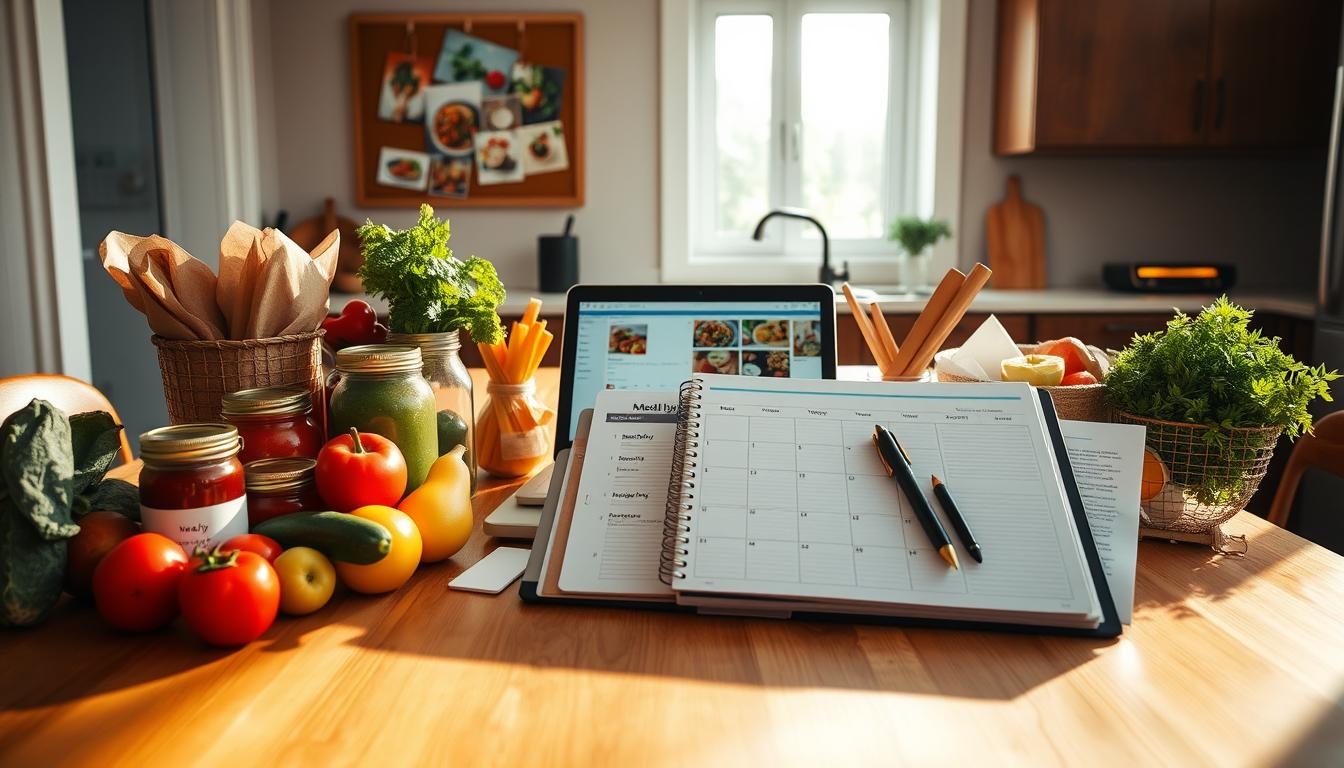Efficient Grocery Shopping for the Week: Planning your meals ahead can change your grocery shopping. Thinking about what you’ll eat all week helps you make a better shopping list. This way, you avoid last-minute takeouts.
Meal planning is more than picking what to eat. It’s a strategy to save time and money. When you plan, you can list what you need and stick to it. This cuts down on impulse buys and food waste.
By shopping wisely, you’ll eat healthier, help the environment, and save money. Let’s look at some easy tips to make meal planning simple.
Contents
- 1 The Benefits of Weekly Grocery Shopping
- 2 How to Grocery Shop for the Week: Planning Phase
- 3 Smart Shopping List Organization
- 4 In-Store Shopping Strategies
- 5 Budgeting and Storage Tips for Weekly Groceries
- 6 Efficient Weekly Grocery Shopping Made Easy
- 7 FAQ: Efficient Grocery Shopping for the Week
- 7.1 How do I start planning my weekly grocery shopping?
- 7.2 What are the benefits of making a grocery shopping list?
- 7.3 How can I save money on my weekly grocery shopping?
- 7.4 What are some tips for storing groceries to keep them fresh?
- 7.5 How can I reduce food waste when grocery shopping for the week?
- 7.6 Can I grocery shop for the week online?
The Benefits of Weekly Grocery Shopping
Shopping for groceries every week can make meal planning easier and cut down on costs. By planning ahead, you can skip the expensive takeouts and eat healthier. This saves money and keeps you on track with your diet.
Weekly grocery shopping also means less food waste. When you plan meals and make a list, you buy only what you need. This way, you avoid buying things that might spoil. It also helps you optimize your grocery budget by sticking to your list.
| Benefits | Without Weekly Grocery Shopping | With Weekly Grocery Shopping |
|---|---|---|
| Food Waste | Higher likelihood of buying unnecessary items | Reduced waste through planned purchases |
| Budget | Impulse buys can inflate grocery bills | Sticking to a list helps in budgeting |
| Meal Planning | Last-minute decisions can lead to unhealthy choices | Planned meals promote healthier eating |
Adding weekly grocery shopping to your routine has many perks. It saves time, cuts down on spending, and helps you eat better. It’s a smart way to grocery shopping on a budget and enhance your shopping experience.
How to Grocery Shop for the Week: Planning Phase
Planning is key to a stress-free grocery shopping trip. Start by planning your meals for the week. Choose breakfast, lunch, and dinner ideas that you like and fit your diet.
Breakfast, Lunch, and Dinner Ideas
Begin by thinking about what you’ll eat each day. On busy days, pick simple meals or use leftovers. You can find ideas online or use a meal planning app.
For breakfast, try oatmeal with fruits, scrambled eggs, or yogurt parfaits. Lunches can be salads, sandwiches, or last night’s dinner. Dinners can be simple or fancy, depending on your time and mood.
Accounting for Leftovers
Remember to plan for leftovers. They save time and reduce waste. Choose meals that can be used again or turned into something new.
Your grocery list should include produce, proteins, dairy, grains, and pantry items. This balance helps keep your diet healthy.
Prioritizing Fresh vs. Pantry Items
Put fresh items like produce, meats, and dairy at the top of your list. They spoil faster. Pantry items like canned goods and pasta last longer and can be bought in bulk.
By planning well, you’ll make a detailed grocery list. It will help you avoid waste and make shopping more efficient. [Efficient Grocery Shopping for the Week]
Smart Shopping List Organization
A well-organized grocery list can change your weekly shopping for the better. It helps you remember important items and makes shopping faster.
There are many ways to organize your list. You can sort items by type, like all dairy together, or by the store’s layout. Digital tools like shopping apps are also great. They let you mark off items as you shop and change your list easily.
| Organization Method | Description | Benefits |
|---|---|---|
| Categorization by Type | Group similar items together (e.g., dairy, meats, produce). | Efficient for planning meals and ensuring you have all ingredients. |
| Store Layout | Organize your list according to the store’s layout. | Reduces backtracking and saves time during shopping. |
| Digital Lists | Use apps or digital tools to create and manage your list. | Easy to update, can be shared, and accessed from multiple devices. |
Choosing the right method for your list is key. It should be both complete and flexible. Life can surprise us, and being able to change your list quickly is a big plus. Mixing digital tools with traditional methods works best.
Smart list organization saves time and reduces stress when shopping. It makes your weekly grocery trips easier and more efficient. [Efficient Grocery Shopping for the Week]
In-Store Shopping Strategies
To get the most out of your grocery shopping, try a few strategies. It’s easy to get distracted by sales and deals in the store. But, sticking to your list helps you avoid impulse buys and stay on budget.
Choosing Items with Appropriate Shelf Life
Think about the shelf life of items and how they fit into your meal plan. For things like dairy, meat, and produce, pick items that last longer. This way, they stay fresh all week.
If you won’t use some produce until later, choose items that are a bit less ripe. This helps them last longer. [Efficient Grocery Shopping for the Week]
- Check the “sell by” or “use by” dates on products.
- Choose products with a longer shelf life for items you won’t use immediately.
- Consider buying in bulk if you have storage space and will use the items before they expire.
Understanding Expiration Dates
Knowing about expiration dates helps you make better choices. The “sell by” date is for retailers, showing when they should sell the product. The “use by” date is when the product is at its best quality.
The “best if used by” date is when the product is still good but not at its peak. Knowing these dates helps you avoid buying spoiled or soon-to-expire items. 
Using these strategies makes your grocery shopping more efficient. It reduces food waste and saves you money.
Budgeting and Storage Tips for Weekly Groceries
To get the most from your weekly grocery shopping, try budgeting and storing your food well. Good budgeting saves you money. Storing food right keeps it fresh all week.
Refrigerator Organization
Keeping your fridge organized is essential for fresh food. Sort your groceries into groups like dairy, meats, and veggies. Use clear bins for leftovers, cheeses, and yogurts. [Efficient Grocery Shopping for the Week]
Managing your pantry is key to a clean kitchen and less waste. Store dry goods like pasta and rice in airtight containers. Labeling helps you find what you need. Use the “first-in, first-out” rule to avoid expired food.
Freezer Storage Techniques
Your freezer is great for keeping food fresh longer. Store meats, veggies, and leftovers in airtight containers or bags. Labeling helps you know what’s in the freezer. Portioning food into smaller servings makes meal prep easier and cuts down on waste.
By using these budgeting and storage tips, you can save money and reduce waste. Good storage and budgeting make grocery shopping more efficient.
See Also: Family Won’t Help? Here’s What to Do
Efficient Weekly Grocery Shopping Made Easy
Now that you know how to shop for groceries for the week, it’s time to start. Plan your meals, make a shopping list, and use smart in-store strategies. This will save you time and money and help reduce food waste.
First, plan your meals and create a shopping list. Organize your list by the store’s layout to make shopping easier. At the store, stick to your list and look for sales on non-perishable items. Also, store your groceries properly to keep them fresh all week.
By following these steps, you’ll become a more efficient grocery shopper. You’ll plan healthy meals, save money, and reduce stress. So, start shopping smarter and make the most of your weekly grocery trip.
FAQ: Efficient Grocery Shopping for the Week
How do I start planning my weekly grocery shopping?
What are the benefits of making a grocery shopping list?
How can I save money on my weekly grocery shopping?
What are some tips for storing groceries to keep them fresh?
How can I reduce food waste when grocery shopping for the week?
Can I grocery shop for the week online?

Hi, I’m Waverly Moon, creator of TipsToFeelBetter.com. This blog is for practical moms and family-focused women seeking simple, realistic ways to improve daily life. From home routines to self-care, I share tips that truly work—because life doesn’t need to be perfect to feel better. Let’s make everyday moments a little easier, together.

